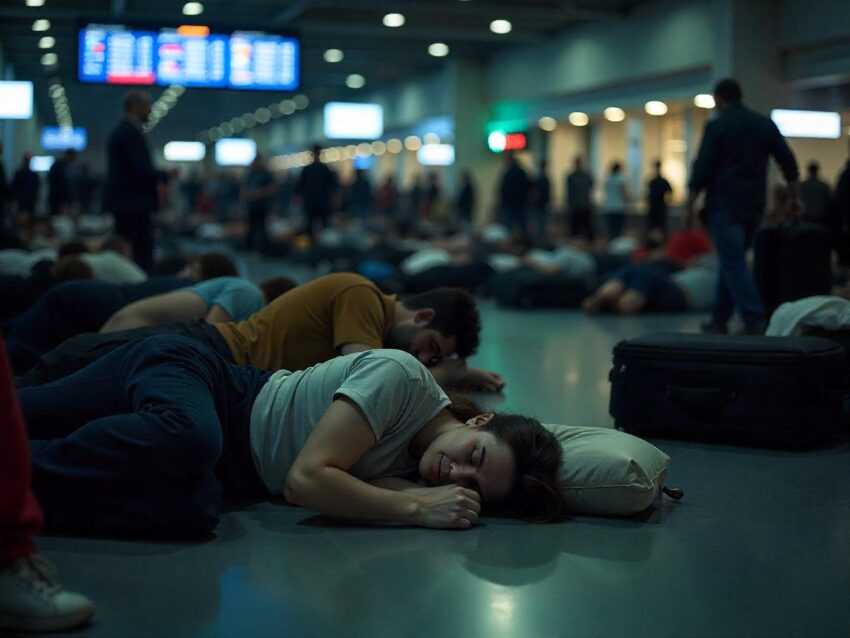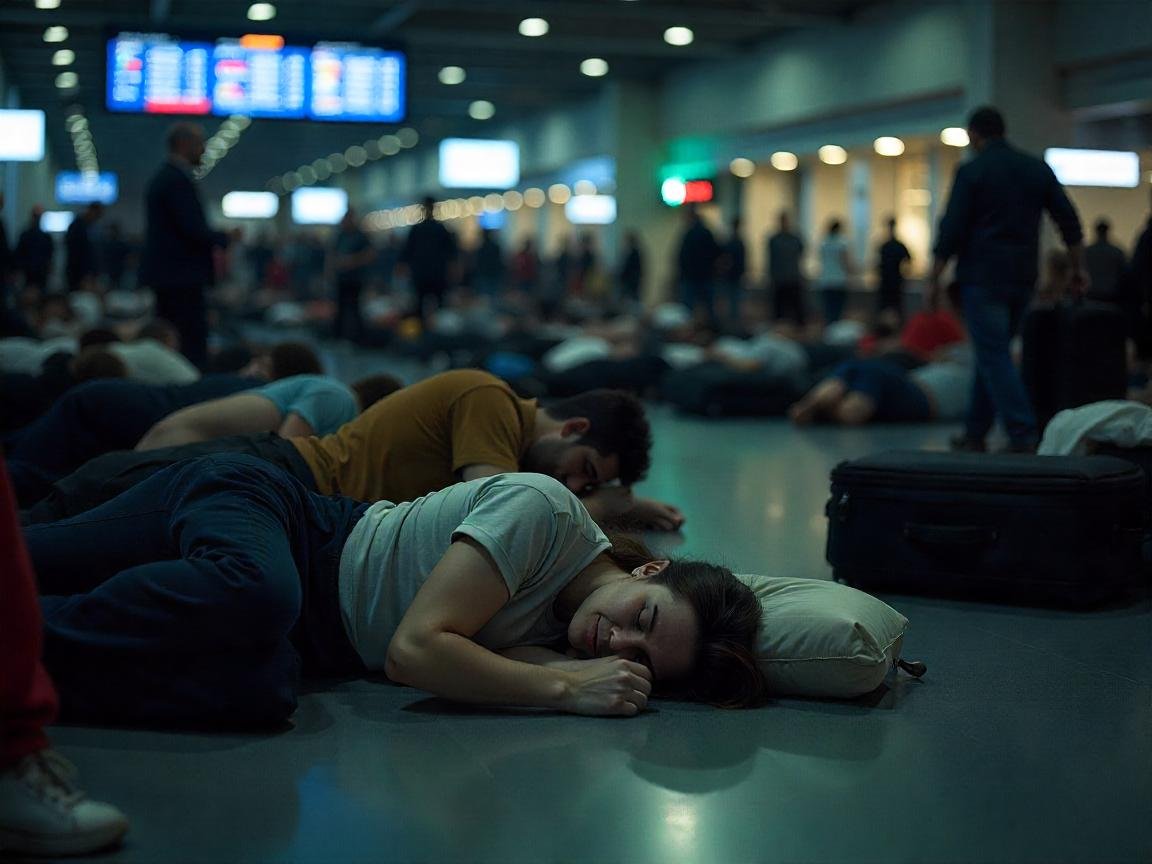Saturday, May 17, 2025

Ryanair passengers are still reeling after being stranded overnight at Rhodes Airport, facing the full brunt of chaos as it unfolded in real time. The weather crisis may have grounded flights, but it was the airline silence that truly intensified the anxiety. Stranded, unheard, and unsupported—these Ryanair passengers found themselves in a confusing and exhausting situation.
As the chaos built inside Rhodes Airport, frustration spilled over. Families curled up on cold floors. Bags became pillows. Hope faded by the hour. Meanwhile, the weather crisis outside raged on, offering no clear timeline for recovery. But inside the terminal, it wasn’t just storms causing damage—it was the deafening airline silence.
Ryanair passengers weren’t alone in facing delays. Yet, unlike other airlines, Ryanair’s absence of support exposed a deeper issue. While some travelers were escorted to hotels or given updates, Ryanair customers felt ignored, abandoned, and unseen.
Moreover, what made the situation worse was not just being stranded overnight at Rhodes Airport, but the lack of answers. No water. No beds. No communication. And no empathy. The emotional toll was real.
So, what’s really happening behind the scenes? Why did Ryanair passengers endure such isolation during a high-profile disruption? What failures in protocol, response, or planning allowed this chaos to escalate? And how can the travel industry do better?
As the weather crisis begins to calm, we take you deep inside the event to uncover what’s really happening behind the scenes—because being stranded shouldn’t mean being forgotten.
What started as a routine journey for dozens of travelers in Rhodes, Greece, turned into a 24-hour ordeal marked by silence, exhaustion, and desperation. As severe weather battered the region, passengers booked on Ryanair flights found themselves stranded at Rhodes Airport, with no information, no accommodation, and not even access to basic necessities like water.
A Breakdown in Airline Responsibility
The disruption began on May 16, when multiple Ryanair flights were cancelled due to a worsening weather system moving northeast from Tunisia. Greece’s national meteorological agency had issued advisories forecasting high winds and storms, prompting several airlines to adjust schedules.
However, while other carriers reportedly moved swiftly—providing accommodation, refreshments, and rebooking options—Ryanair passengers were left in limbo. As time passed, photos of travelers sleeping on airport floors and using their luggage as pillows began circulating on social media.
Tension escalated. Hope faded. Communication was nonexistent.
A Human Crisis in a Digital Age
Passengers described the situation as a complete communication breakdown. Many tried calling Ryanair’s helpline for hours with no response. Some said they were left on hold indefinitely. Others found themselves stuck between automatic emails and airport staff who had no authority to act.
People were thirsty. Children were crying. Elderly passengers appeared fatigued and confused.
While technology is meant to make travel smoother, this incident shows the devastating impact when tech systems replace human support, especially in times of disruption. Passengers reported no guidance, no staff at help desks, and no confirmed departure reschedules. The result: widespread anxiety, misinformation, and rising anger.
The Weather Factor—But Not the Whole Story
Yes, the weather played a role. The Hellenic National Meteorological Service (HNMS) had predicted turbulent conditions that would affect air traffic. Airlines must prioritize safety, and cancellations under such circumstances are valid.
However, cancellations are only part of the story. What followed—the absence of assistance, shelter, or information—painted a far more troubling picture.
Passengers weren’t just grounded by weather. They were abandoned by process.
Ryanair’s Silence Sparks Industry Criticism
Ryanair has faced criticism before over its low-cost, no-frills model. But industry experts now point to a growing accountability gap in customer care. As demand for low-cost travel rises, airlines must evolve their service models—not shrink them.
Airlines operating in high-volume tourist regions like Greece must plan for seasonal surges and inevitable disruptions. Passenger protection should not be optional. Emergency protocols should activate the moment a flight is delayed, not hours after customers are already in distress.
Moreover, the European Union’s Regulation EC 261 provides clear guidelines for passenger rights during flight delays and cancellations—including meal vouchers, accommodation, and transportation. Several travelers in Rhodes say these standards were not met.
Tourism Impact and Seasonal Fallout
This incident arrives at a critical moment. Greece is entering its peak summer travel season, with millions of tourists expected across the Aegean islands. Travel confidence is everything.
Airports like Rhodes serve as vital gateways to the country’s tourism economy. Events like this damage reputation, erode traveler trust, and risk pushing holidaymakers toward competitors—both airlines and destinations.
For Ryanair, which carries millions of European passengers annually, the stakes are even higher. One misstep can go viral. One neglected airport can cost market share.
Government and Regulatory Watch
With tensions rising at Rhodes, questions now swirl around whether Greece’s Civil Aviation Authority will launch an investigation. Additionally, EU travel watchdogs may be urged to monitor how airlines uphold passenger rights—particularly in regions prone to climate-related travel disruption.
The Greek Tourism Ministry may also need to evaluate how regional airports can support stranded passengers better. With climate volatility increasing, crisis management needs to be embedded into airport design and airline policies.
Lessons for the Travel Industry
This incident is more than a customer service failure. It’s a warning to the travel and tourism sector. Low-cost can’t mean low-accountability. Digital booking flows cannot replace human help when things go wrong.
As global travel resumes momentum post-pandemic, passengers expect reliability, respect, and readiness. Airlines that fall short risk being called out—not just by passengers but by partners, regulators, and media.
What Happens Next?
The stranded passengers in Rhodes have now spent more than 24 hours without clear answers. Some report rebookings for the next day. Others still wait.
What’s certain is that this episode has ignited fresh scrutiny over Ryanair’s crisis response playbook. Airlines must not only navigate the skies—they must navigate human emotion, uncertainty, and the expectation of care.
Until that happens, travel chaos like this will keep unfolding.

